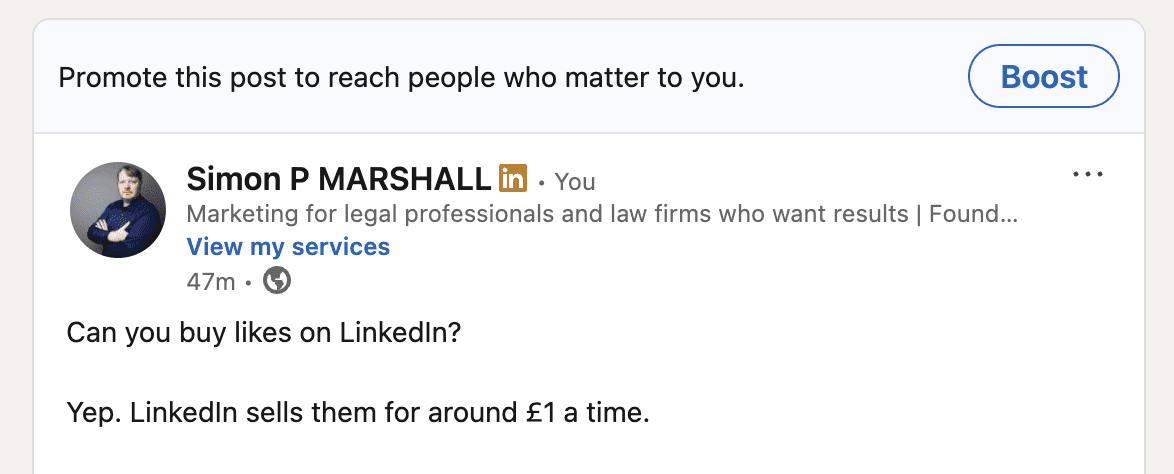In what is a very crowded marketplace, one of the perennial questions that law firms keep having to ask themselves is how best to get in front of the biggest possible audience (and maybe how to drive traffic to their website). There are several options available to them, one of which is the use of syndication sites such as Lexology and Mondaq, which charge law firms to publish blogs on their site.
In my humble opinion, however, going down this route doesn’t necessarily provide law firms with enough bang for their buck – and it’s a lot of bucks: Lexology doesn’t publish its prices, but my anonymous sources tell me that they are charged in the region of £10,000 to £20,000 a year. And a sole practitioner in the US said in a Reddit post last year (here) that they had paid $5,500 to subscribe to the system.
So, in today’s edition of Si’s Matters, I want to set out what I see as the problems with the syndication model, and suggest alternative approaches and questions that we need to ask as marketing professionals and knowledge professionals.
Paying the poacher to steal your audience
In theory, using syndication sites to publish your blogs brings a different audience to your door. But in reality, what ends up happening is that the same audience is confronted with two different locations for your content when they conduct their Google search using relevant keywords – and because Lexology and its ilk often have a stronger domain than you, and therefore rank higher than your own website, that is where your audience will head. Higher results on Google get all the clicks.
Let’s be clear here: these syndication sites change nothing about the blog itself. This means that they directly compete with your website version of the blog, unless you write a second version for your own website. But either way, it will mean that the syndication site often ranks higher than your website, which means more traffic for their blog.
I’ve played with some data this week for quite a few of our clients’ website analytics to see how much traffic comes from their site and, sadly, the conclusion is that these sites will send you little or no website traffic in return for your money, and often offer you few useful backlinks. Unless I am somehow mistaken, it’s difficult to discern a benefit here.
For the same amount of money these syndication services charge, firms can, for example, pay to have their profiles on the websites of the leading legal directories such as Chambers & Partners and The Legal 500 – these deliver about the same amount of traffic to the respective firm website as the syndication service-providers, but have the added benefit of creating a residual hero effect and giving firms the cache of a respected, independent third-party endorsement. They’re not pay-to-play: you can be ranked for free, but you won’t get referral traffic if you don’t pay. Presumably, those who click through have been convinced by your credentials as ranked on the site, so it’s kind of a hot lead.
In my experience from working at six law firms, and alongside another 50 more as clients, the decision to appear on Lexology et al is often driven by PSLs in the firm’s knowledge team, who are rightly interested in generating greater numbers of readers of their articles. The problem is that a lot of these readers are not the target audience. Once we drill down into who’s reading it that we want to reach, the cost per read is actually quite high. The cost per target reader, even higher.
In my opinion, CMOs, knowledge leaders and digital marketing managers, therefore, need to be asking themselves the following questions in relation to using syndication sites: what does it achieve for you that you cannot achieve more efficiently and effectively some other way? What are you spending your money on and for?
These services may look like the right tool if the answer is “we need more profile”. But they don’t look like the right tool for addressing the reasons why you need more profile. Does having your blogs on these sites deliver the right audience in the right quantity? Or are they simply too scatter-gun in nature to accurately hit the mark(s)?
Do you believe in life after Lexology?
I think that law firms can afford to be braver and demonstrate the courage of their own convictions by instead seeking to dominate the Google results for the relevant keyword searches. It is a bold move, but believing in the strength of your own brand and not relying on an opaque promise of outside help to drive traffic feels like the right way to go, in my opinion. So, how do we go about it?
One option is to create some absolutely brilliant evergreen content that will dominate the rankings and bring the right kind of traffic to your website, obviating the need to advertise in the first place.
The second option is to use Google advertising and drive the right kind of content to your website, with people searching based on a specific need.
The third option is to pay for LinkedIn ads, which allows you to precision-target your content to ensure it gets seen by the right people.
The fourth, free, option is to have the author and their colleagues all write about the piece in a personal post, which is far more likely to reach the intended audience on LinkedIn, Twitter, Facebook and, increasingly in my experience, WhatsApp.
As with all law firm marketing budgets in 2024, we need to ask the simple question: what’s the alternative? Can we achieve the same outcomes more efficiently using a different method? After over 20 years spent working in the legal sector, I remain to be convinced that Lexology is the right answer. But I’m more than happy to be proven wrong. And I am, of course, aware that I am making these comments in the week it was announced that Lexology’s parent company, Law Business Research, has been bought by Intermediate Capital Group for £650m. This price tag also includes some great titles like Global Arbitration Review and Global Investigations Review, both of which are nonpareil and beyond reproach – but it does leave me wondering if the Lexology business model will now evolve.
Ultimately, it is time for law firms to get much more commercial about the content they create and publish on their website, who gets to see it, and whether or not they are putting money into the right people’s pockets to ensure the content gets any further reach.
In other news
Legal sector still suffers from large gender pay gap
This week, The Law Society Gazette featured an article on the gender pay gap among legal professionals, which stands at 17.6% and is therefore significantly above the UK average for all occupations – and this despite 60% of lawyers being women.
Do some lawyer investigations serve as a figleaf?
On Sunday, The FT ran a piece that casts a spotlight on the rigour and indepence of some lawyer investigations in the wake of high-profile accusations of whitewashing by the likes of Nigel Farrage and other prominent figures.
You should have seized his yacht, says oligarch’s ex-wife
As reported in The Times this week, Tatiana Soroka – the ex-wife of oligarch Farkhad Akhmedov – is suing Payne Hicks Beach despite the firm helping her to secure a £453m court-ordered divorce settlement in 2016. Why? Because according to Soroka, her lawyer Baroness Shackleton of Belgravia negligently failed to seize a £200 million yacht belonging to her ex-husband. A case of monster ingratitude, perhaps?
A&O Shearman goes live
After a year of planning and organising, 1 May marked the official birth date of A&O Shearman. The Lawyer covered this momentous occasion with a piece giving some insights into the process and featuring quotes from new managing partner Hervé Ekué and the new chair of the combined firm’s US business, Adam Hakki.
Meet Tomas McCabe, the mind-reading trainee barrister
Good barristers are often born performers – so it comes as no surprise that a trainee barrister by the name of Tomas McCabe is also a professional magician specialising in mind-reading. Tomas will be taking his show 1 Murder: The Mind-Reading Lawyer to the Edinburgh Fringe this year – check him out if you happen to be visiting the Windy City this August.
I hope you’ve enjoyed this week’s edition!
Si






